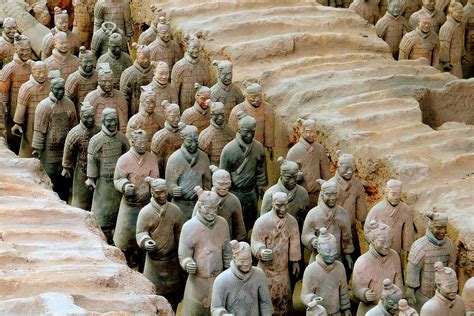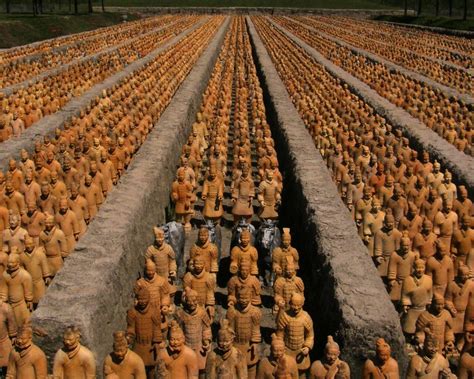first emperor china tomb excavation Qin Shi Huangdi (259 BC - 210 BC), the first emperor of China, ascended the throne at the age of 13, when construction of his tomb began. On completion of his many conquests, he ordered 720,000 conscript laborers to . A small excavating job can cost about $100 per hour, but larger jobs can range between $1,500 and $5,000. Additionally, small, difficult-to-reach spaces and challenging terrain can increase the price of excavation.
0 · where was qin shi huang buried
1 · terracotta warriors official website
2 · terracotta warriors museum official website
3 · terracotta army official website
4 · qin shi huangdi tomb inside
5 · has qin shi huang's tomb been opened
6 · emperor qin shi huangdi tomb
7 · archaeologists are too scared to open up the tomb of china’s first emperor
How to Operate a Mini-Excavator - 2020 Tutorial, entry level excavator controls overview. We’ve taken feedback from our viewers on our previous Mini Excavato.
It appears that the mission of this Terracotta Army was to guard the nearby mausoleum of Qin Shi Huang, the formidable first emperor of the Qin dynasty who ruled from . Learn about the first emperor of China, his opulent tomb complex and the army of clay soldiers that guard it. Find out why the central tomb remains unexcavated and what .
Learn the reasons why the underground palace of the First Qin Emperor remains unexcavated, such as limited technology, deep depth, long time, and environmental risk. Find . Qin tomb is the burial place of the first Qin emperor, who unified China and built the Great Wall. It contains a vast underground palace, a terra-cotta army, and other treasures, but the tomb itself remains unexcavated. Qin Shi Huangdi (259 BC - 210 BC), the first emperor of China, ascended the throne at the age of 13, when construction of his tomb began. On completion of his many conquests, he ordered 720,000 conscript laborers to .
Archaeologists have unearthed a 16-tonne coffin and a lavish funerary collection at the Terracotta Warrior complex of China’s first emperor. The tomb is likely the burial of Prince . Learn about the history and mystery of the Mausoleum of the First Qin Emperor, the burial complex of China's first unifier. See images of the terracotta warriors, the hillock, and the mercury traces detected by lidar mapping. Learn about the discovery and excavation of the terracotta army of the first emperor of China, Qin Shi Huang, at his burial complex in Xian. Find out how the figures were made, .The mausoleum of Qin Shi Huang, the first emperor of the Qin dynasty, is a large tomb complex with a pyramid-shaped mound and a necropolis of terracotta soldiers. It is a UNESCO World Heritage Site and a cultural symbol of ancient China.
It appears that the mission of this Terracotta Army was to guard the nearby mausoleum of Qin Shi Huang, the formidable first emperor of the Qin dynasty who ruled from 221 to 210 BCE.Learn about the discovery and excavation of the massive tomb complex of Qin Shi Huangdi, who declared himself the first emperor of China in 221 B.C.E. See the terracotta warriors, the tumulus, and the underground chambers that reveal his vision of an eternal empire.
Learn about the first emperor of China, his opulent tomb complex and the army of clay soldiers that guard it. Find out why the central tomb remains unexcavated and what mysteries it may reveal. Learn the reasons why the underground palace of the First Qin Emperor remains unexcavated, such as limited technology, deep depth, long time, and environmental risk. Find out what is buried inside the mausoleum and how to visit the terracotta warriors pits. Qin tomb is the burial place of the first Qin emperor, who unified China and built the Great Wall. It contains a vast underground palace, a terra-cotta army, and other treasures, but the tomb itself remains unexcavated.
Qin Shi Huangdi (259 BC - 210 BC), the first emperor of China, ascended the throne at the age of 13, when construction of his tomb began. On completion of his many conquests, he ordered 720,000 conscript laborers to hurry up on building his royal tomb. Archaeologists have unearthed a 16-tonne coffin and a lavish funerary collection at the Terracotta Warrior complex of China’s first emperor. The tomb is likely the burial of Prince Gao, one of 50 children of Qin Shi Huang, who unified China in 221 BC.

Learn about the history and mystery of the Mausoleum of the First Qin Emperor, the burial complex of China's first unifier. See images of the terracotta warriors, the hillock, and the mercury traces detected by lidar mapping. Learn about the discovery and excavation of the terracotta army of the first emperor of China, Qin Shi Huang, at his burial complex in Xian. Find out how the figures were made, what they.The mausoleum of Qin Shi Huang, the first emperor of the Qin dynasty, is a large tomb complex with a pyramid-shaped mound and a necropolis of terracotta soldiers. It is a UNESCO World Heritage Site and a cultural symbol of ancient China.
where was qin shi huang buried
It appears that the mission of this Terracotta Army was to guard the nearby mausoleum of Qin Shi Huang, the formidable first emperor of the Qin dynasty who ruled from 221 to 210 BCE.Learn about the discovery and excavation of the massive tomb complex of Qin Shi Huangdi, who declared himself the first emperor of China in 221 B.C.E. See the terracotta warriors, the tumulus, and the underground chambers that reveal his vision of an eternal empire.
skid steer attachments for food plots
Learn about the first emperor of China, his opulent tomb complex and the army of clay soldiers that guard it. Find out why the central tomb remains unexcavated and what mysteries it may reveal. Learn the reasons why the underground palace of the First Qin Emperor remains unexcavated, such as limited technology, deep depth, long time, and environmental risk. Find out what is buried inside the mausoleum and how to visit the terracotta warriors pits.
Qin tomb is the burial place of the first Qin emperor, who unified China and built the Great Wall. It contains a vast underground palace, a terra-cotta army, and other treasures, but the tomb itself remains unexcavated. Qin Shi Huangdi (259 BC - 210 BC), the first emperor of China, ascended the throne at the age of 13, when construction of his tomb began. On completion of his many conquests, he ordered 720,000 conscript laborers to hurry up on building his royal tomb. Archaeologists have unearthed a 16-tonne coffin and a lavish funerary collection at the Terracotta Warrior complex of China’s first emperor. The tomb is likely the burial of Prince Gao, one of 50 children of Qin Shi Huang, who unified China in 221 BC. Learn about the history and mystery of the Mausoleum of the First Qin Emperor, the burial complex of China's first unifier. See images of the terracotta warriors, the hillock, and the mercury traces detected by lidar mapping.
terracotta warriors official website

terracotta warriors museum official website
Comparing CFG STE35SR, KU45, and NT45 Chinese mini excavators. Restoration Projects.
first emperor china tomb excavation|emperor qin shi huangdi tomb